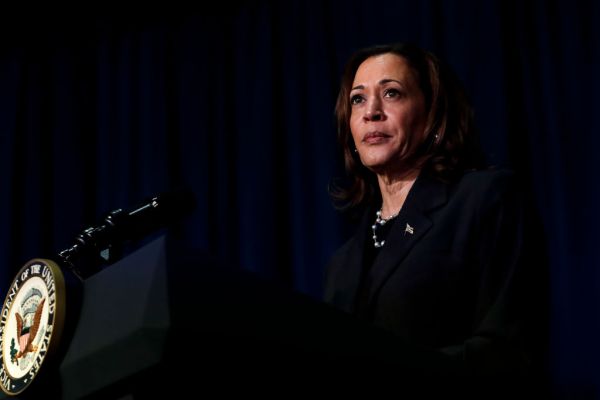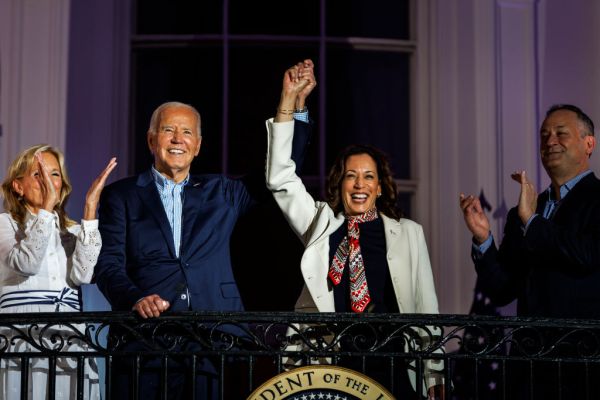Yesterday, I imagined telling myself 10 years ago that I’d be voting for Kamala Harris in 2024 and watching as that younger self tried to puzzle out what would need to go wrong in America to make such a thing possible.
“Did every Republican in the country … die?” he would ask, his voice quavering.
“Yes, civically,” I would answer, leaving him to wonder what that might mean.
The Democratic nomination is technically up for grabs as I write this, less than 24 hours after the Left’s “Joe must go” chorus welcomed Joe himself as a member, but any doubt that Harris will claim it collapsed as quickly as the Biden campaign did on Sunday afternoon. By midnight, nearly every major figure in the party had endorsed her, the president included. Grassroots euphoria at the news unlocked an astounding $81 million and counting in donations to the platform ActBlue by Monday evening.
In hindsight, a quick coronation was inevitable. After gritting through one of the worst months in the history of American politics, Democrats are gassed.
Their nominee exposed himself as grotesquely unfit before a national audience of more than 50 million people. Members of his party spent every day since, in the thick of a presidential campaign, fighting with each other over his viability instead of campaigning against Donald Trump. Meanwhile, the polling in swing states turned gruesome. Major donors closed their wallets. Getting wiped out in an election many regard as existential became a real and growing possibility.
Any appetite the party might have had for further discord at an open convention was exhausted by the ordeal. For Democrats, Biden’s withdrawal was the political equivalent of a prisoner being granted a last-second stay of execution: Joy and communion, not rancor, are what human beings naturally feel when given an unexpected new lease on life. Liberals want to hug each other now, not fight.
It would be churlish to begrudge them that after the stretch of misery they’ve endured. But it would not be churlish to note how their sudden emotional intoxication has blinded them to reality.
As a nominee, Harris is an improvement over Biden. Just about anyone would be. But the fact that Democrats are ecstatic at having improved their prospects overnight (literally!) doesn’t excuse some of the wishful thinking passing for analysis today.
Intoxication, it turns out, is almost as bad for punditry as it is for driving. Here are four bad takes I’ve seen circulating on social media today.
“Kamala Harris is a decent—maybe even solid—candidate.”
She’s an objectively bad candidate. Below replacement level, as baseball nerds might say.
It’s been a while since Democrats had a formidable nominee. I suppose Joe Biden in 2020 would qualify as “solid” given his experience and centrist reputation, but even he barely held on to win in battleground states against a sociopath sagging under the weight of a once-in-a-century pandemic.
Harris won’t break the slump. She’s certainly less viable as a national candidate than various swing-state governors, like Michigan Gov. Gretchen Whitmer and Pennsylvania Gov. Josh Shapiro, would be. And for all his faults, even California Gov. Gavin Newsom would at least be a talented messenger on the trail. True, he’s burdened by a progressive record in California, but is that worse than being burdened by Joe Biden’s record as president?
Harris is on the hook for all of it—inflation, Afghanistan, and a gross dereliction of duty at the border that’s turned America into a nation of immigration hawks. She’s the answer to the question, “What if we took everything voters dislike about Joe Biden and solved only the age problem?”
She doesn’t even fully solve that. While Biden has been quietly deteriorating behind the scenes, Harris spent the past three years repeatedly defending his cognitive wherewithal in interviews. If the polling is right that “voters are deeply distrustful of elected officials who vouch for the president’s mental capacity,” how much will they come to distrust Harris once those old soundbites of her vouching for Biden start airing in Republican ads?
Since becoming vice president, Harris has distinguished herself as an unusually hapless retail politician, so much so that she reportedly felt moved to rehearse her attendance at a dinner. It’s not just the word-salad answers in interviews, it’s the fact that she couldn’t commit to her own positions as a presidential candidate in 2019 and resorted to flip-flopping in hopes of satisfying all sides. I felt reasonably confident after three and a half years of watching them as vice presidents that I knew what Mike Pence, Joe Biden, and Dick Cheney believed in. Apart from her stance on abortion rights, I truly have no idea what Harris really believes.
Whether her race and sex will impose any special electoral hardships on her remains to be seen, but I’m not optimistic that Biden’s gains among older voters and white men will hold with a younger black woman from California leading the party. Remember, as unpopular as he’s been for most of his presidency, she’s less popular still.
Even the people who know her best doubt her. Citing three Biden aides, Axios reported Monday that “President Biden hesitated to drop his reelection campaign in part because he and his senior advisers worried that Vice President Kamala Harris wasn’t up to taking on Donald Trump.” All she needs to do is paint a convincing portrait of a capable candidate for 12 measly weeks—yet Team Joe seems to doubt that she can do even that.
I wonder, in fact, if the reason 2028 hopefuls like Whitmer and Shapiro moved to endorse her so quickly after Biden withdrew is because they believe Trump is likely to win in November no matter what. Better to have Harris act as sacrificial lamb this year and be dubbed a loser in the next cycle, they might reason, than let themselves be drafted into the thankless role themselves.
Here’s how it’s going to go, I think. For the next month and through the convention, with Democratic enthusiasm for its new nominee peaking, the race between Harris and Trump will look competitive. In September, as the public tunes in and digests her public appearances, her numbers will start to slide as they’re reminded that Harris is Harris. By October, Democrats will be diverting money to congressional races down ballot in hopes of preventing total Republican control of government.
It didn’t need to be that way. Which brings us to the second bit of wishful thinking.
“Joe Biden is a hero for standing aside to give his party a better chance to beat Trump.”
Joe Biden and his family are the villains in this story, not the heroes. If Donald Trump is reelected this fall, they’ll be the reason why.
That will be hard for some to hear given the sympathy they feel for the president. Age visits indignity upon us all, but it’s happened to him on the grandest stage and at the least opportune moment, causing friends to turn on him and shove him into retirement. It’s tragic. It never should have come to this.
But it did, because Biden and his family insisted on it.
The Wall Street Journal reported on Monday that it’s been nearly three years since the president met with House Democrats to discuss legislation. “In 30 minutes of remarks on Capitol Hill, Biden had spoken disjointedly and failed to make a concrete ask of lawmakers, according to Democrats in the room” in October 2021, the paper reported. No further meetings were held, the reader is left to assume, because he and his aides feared what sort of image he might cut if forced again to speak extemporaneously at length.
Concerns about Biden’s condition grew over the next two years. “He started looking like he was struggling more physically and mentally, probably by about the end of [2023], to a degree greater than it had been before,” Rep. Adam Smith of Washington told the Journal. Lawmakers and party donors noticed. So why did Joe Biden, American hero, and his heroic advisers persist with their campaign, not knowing what sort of condition he might be in by November 2024?
Where would we be right now if they hadn’t foolishly agreed to debate Trump two months before the Democratic convention? Is there any doubt that they’d still be covering up his deterioration, gambling the future of the country on his ability to avoid a catastrophic public display of senescence before Election Day?
It wasn’t patriotism that led the president to withdraw on Sunday, it was polling. His closest aides reportedly came to him with new data from battleground states that “showed his path to victory in November was gone,” with Biden “not just trailing in all six critical swing states but collapsing in places like Virginia and New Mexico where Democrats had not planned on needing to spend massive resources to win.”
That left him to choose among three flavors of humiliation. He could quit the race in humiliation now, admitting that he’s too enfeebled and unpopular to have a chance at winning. He could stay in the race, become his party’s nominee, and be humiliated by Trump in November. Or he could stay in the race temporarily and be humiliated by a mass revolt of congressional Democrats urging him to drop out, which was reportedly in the works this week. “Nancy [Pelosi] made clear that they could do this the easy way or the hard way,” one Democrat told Politico, referring to Biden and his team. “She gave them three weeks of the easy way. It was about to be the hard way.”
If you must find a hero in the story of Biden’s decision to withdraw, Pelosi is a better choice than the president. She’s the one who saw electoral reality clearly and who chose to place the welfare of the party, and ultimately the country, above her own feelings. And she’s presumably happy with the outcome, unlike the president. “He’s really pissed off,” one insider said of Biden to NBC News, which described him as “isolated, frustrated and angry” and feeling “betrayed by allies who turned on him in his hour of need.”
A truly heroic Joe Biden would have reckoned honestly with his health a year ago (or earlier) and stood aside then in order to give talented Democratic hopefuls time to mount campaigns. Having, say, Gretchen Whitmer as nominee instead of Harris might be the difference between a 60 percent chance of victory in November and a 20 percent chance. Instead, he delayed getting out until after he had already begun collapsing in the polls, sidelining the strongest potential nominees in the process and giving his party little choice but to take its chances with a below-replacement-level candidate.
He’ll spend the next three months being feted for having done the “selfless” thing by withdrawing. But if Harris loses, the what-ifs that follow will not be kind to Joe Biden. The man who rid America of Trump in 2020 will be the man who resurrected an even more dangerous version of him in 2024 for no better reason than pigheaded vanity.
“Now that Biden is out, this election can go back to being a referendum on Trump.”
Nonsense. But even if it weren’t nonsense, why should anyone assume in 2024 that a referendum on Trump would necessarily result in a Democratic victory?
Trump could start torturing puppies at his rallies and 40 percent of the country would still vote for him. Another small but significant percentage will vote for him out of simple nostalgia for the cost of living circa 2019. Another sliver will support him in the belief that no Democrat will take border enforcement anywhere near as seriously as Trump would.
The idea that Americans are too disgusted by Trump to reelect him unless the other party figures out a way to disgust them more is what we might call “January 7 thinking.” The day after the insurrection, naifs like me assumed that the stigma of what Trump had done would follow him forever. Three years later, one surveys his political position and thinks: What stigma?
But fine, let’s pretend that Trump would inevitably lose an election that became a referendum on him. Nominating Kamala Harris three and a half months out from Election Day guarantees that we won’t have that sort of election.
Voters will spend the rest of the campaign scrutinizing her intently, trying to cram a full election cycle’s worth of knowledge about a would-be president into 15 weeks or so. In fact, they needn’t pay any attention to Trump at all: Uniquely among all possible Republican nominees, he’s a former president and therefore the definition of a known political quantity.
If the election is destined to become a referendum on either candidate, it’ll be a referendum on Harris—and the unpopular Biden record she’ll be forced to defend—more so than on Trump. And if you think that’s likely to work out for Democrats, you must have skipped the first half of this newsletter.
Already some Democrats have begun mischievously pointing out that, with Biden’s exit from the race, it’s now Trump who’s the oldest presidential nominee in U.S. history. If it’s true that voters have thus far approached the election as a referendum on whether the very old guy on the ballot can still do the job, Harris and her party are inviting them to continue with that approach. There’s still a very old guy on the ballot! Can he do the job?
The problem is that that same very old guy took a bullet to his ear nine days ago and reacted instantly by pumping his fist at his fans and exhorting them to “fight, fight, fight!” as the Secret Service dragged him out of harm’s way. Less than a week later, he spoke (mostly) off the cuff at his party’s convention for almost 90 minutes, concluding after midnight on the East Coast.
I find it hard to believe that swing voters who’ve absorbed those impressive displays of vigor and who remain open to voting for Trump will decide that him being 18 years older than his opponent instead of three years younger now obliges them to vote for her.
You can look at the last nine years of American politics, in fact, as one long extended referendum on whether a figure as morally dissolute as him should be viable for high office in America. He won that referendum. My 10-years-younger self wouldn’t be able to fathom it, but it is what it is.
“The Right’s racist and sexist attacks on Harris will backfire.”
Speaking of naivete.
What have you seen from the people of this country since 2015 to make you believe that they won’t tolerate—let alone relish—seeing a candidate demeaned in unusually nasty personal terms?
That’s Trump’s entire brand. His career in politics began with him mocking John McCain for being taken captive by the Vietnamese; he won the presidency the following year, nearly won it again in 2020, and will probably win it a second time this fall, ridiculing and belittling his opponents the whole way. His apologists, among them supposedly respectable conservatives, have come to treat tolerating his “mean tweets” as a sort of fee that’s well worth paying as the price of “strong” leadership.
It will be a strange footnote of history that in two of his three runs for president, the most boorishly macho presidential candidate America has ever produced was opposed by women. Insofar as women leaders are already taken less seriously than men and assumed to be less willing to confront enemies, Trump’s cartoonish bravado and obsession with dominance makes the contrast between his alleged strength and their alleged weakness starker.
Meanness is how he demonstrates “strength” and dominance, and Americans like strength in a leader. He and his fans are about to test how much.
Some populists have already started calling Kamala Harris a “DEI candidate” because of the racial and gender diversity she added to the Democratic ticket in 2020. Others have begun attacking her as a “side piece” who slept her way to the top due to her relationship years ago with San Francisco Mayor Willie Brown. As you’d assume, sexual comments about women candidates affect how seriously voters take them: In one study, “those who saw … objectifying commentary about a hypothetical woman candidate were less likely to perceive her as credible and suited for public office.”
The nastiest stuff aimed at Harris will come from Trump’s surrogates rather than from the candidate himself, but he’s serious enough about this line of attack to have already winked at her sexual history in his own words. “She did poorly in the [2020] Democrat Nominating process, starting out at Number Two, and ending up defeated and dropping out, even before getting to Iowa,” he wrote on July 4, “but that doesn’t mean she’s not a ‘highly talented’ politician! Just ask her Mentor, the Great Willie Brown of San Francisco.”
At this point you’re thinking, “What about Trump’s sexual history? The dozens of women who’ve accused him of misconduct? The sexual abuse verdict that was rendered against him just last year?”
Again I ask: Have you followed politics in this country at all since 2015?
There will be a backlash on the left as the racist and sexist attacks on Harris get uglier, certainly. It might be worth something to her in terms of grassroots left-wing donations. Or, if Republicans really press their luck, it could offend some disenchanted Democrats who have been drifting right since 2020.
But I assume the nastiness will serve its purpose by convincing swing voters who are otherwise Harris-curious that she deserves neither their respect nor their vote. She’s an accidental nominee to begin with; the more she’s demeaned, the less seriously she needs to be taken.
If nothing else, focusing attention on her race and gender will sharpen the stakes of the election for an increasingly nationalist party that views its tribe as the one for “real Americans” and the other tribe as the one for everyone else. A black liberal woman from San Francisco is as far afield from “real America” as one can get. And the further away one gets, the more using any weapon at hand in political combat is justified.
I’d estimate a badly diminished Joe Biden had around a 5 percent chance of defeating Trump in November, whereas Kamala Harris clicking on all cylinders has a roughly 20 percent chance. That ain’t nothing. If you’re gambling on the future of the constitutional order, 5-to-1 odds is meaningfully better than 20-to-1. To borrow the terminology of election forecasters, replacing Biden with Harris moves the race from “Solid R” to “Likely R.”
More importantly, a nominee who can inspire some excitement might turn out enough Democrats to flip the House and hold down losses in the Senate. If Harris manages to secure either of those outcomes, she’ll have done her country a great service by assuring an institutional check on Trump in his second term.
But we shouldn’t let wishful thinking blind us to reality. All the coconut tree and Brat memes in the world won’t change the fact that Harris is likely to lose. She could conceivably perform badly enough in interviews over the next month to create a last-second push for an open convention after all. If she’s not outperforming Biden meaningfully in polling against Trump come mid-August, what then?







Please note that we at The Dispatch hold ourselves, our work, and our commenters to a higher standard than other places on the internet. We welcome comments that foster genuine debate or discussion—including comments critical of us or our work—but responses that include ad hominem attacks on fellow Dispatch members or are intended to stoke fear and anger may be moderated.
With your membership, you only have the ability to comment on The Morning Dispatch articles. Consider upgrading to join the conversation everywhere.